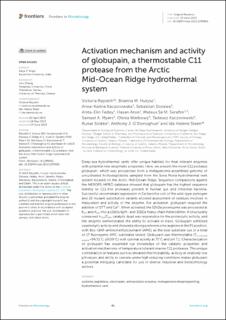Activation mechanism and activity of globupain, a thermostable C11 protease from the Arctic Mid-Ocean Ridge hydrothermal system
Røyseth, Victoria; M. Hurysz, Brianna; Kaczorowska, Anna-Karina; Dorawa, Sebastian; Fedøy, Anita-Elin; Arsin, Hasan; Sá M. Serafim, Mateus; A. Myers, Samuel; Werbowy, Olesia; Kaczorowski, Tadeusz; Stokke, Runar; O'Donoghue, Anthony J.; Steen, Ida Helene
Journal article, Peer reviewed
Published version

Åpne
Permanent lenke
https://hdl.handle.net/11250/3085981Utgivelsesdato
2023Metadata
Vis full innførselSamlinger
- Department of Biological Sciences [2235]
- Registrations from Cristin [9791]
Sammendrag
Deep-sea hydrothermal vents offer unique habitats for heat tolerant enzymes with potential new enzymatic properties. Here, we present the novel C11 protease globupain, which was prospected from a metagenome-assembled genome of uncultivated Archaeoglobales sampled from the Soria Moria hydrothermal vent system located on the Arctic Mid-Ocean Ridge. Sequence comparisons against the MEROPS-MPRO database showed that globupain has the highest sequence identity to C11-like proteases present in human gut and intestinal bacteria. Successful recombinant expression in Escherichia coli of the wild-type zymogen and 13 mutant substitution variants allowed assessment of residues involved in maturation and activity of the enzyme. For activation, globupain required the addition of DTT and Ca2+. When activated, the 52kDa proenzyme was processed at K137 and K144 into a 12kDa light- and 32kDa heavy chain heterodimer. A structurally conserved H132/C185 catalytic dyad was responsible for the proteolytic activity, and the enzyme demonstrated the ability to activate in-trans. Globupain exhibited caseinolytic activity and showed a strong preference for arginine in the P1 position, with Boc-QAR-aminomethylcoumarin (AMC) as the best substrate out of a total of 17 fluorogenic AMC substrates tested. Globupain was thermostable (Tm activated enzyme = 94.51°C ± 0.09°C) with optimal activity at 75°C and pH 7.1. Characterization of globupain has expanded our knowledge of the catalytic properties and activation mechanisms of temperature tolerant marine C11 proteases. The unique combination of features such as elevated thermostability, activity at relatively low pH values, and ability to operate under high reducing conditions makes globupain a potential intriguing candidate for use in diverse industrial and biotechnology sectors.
